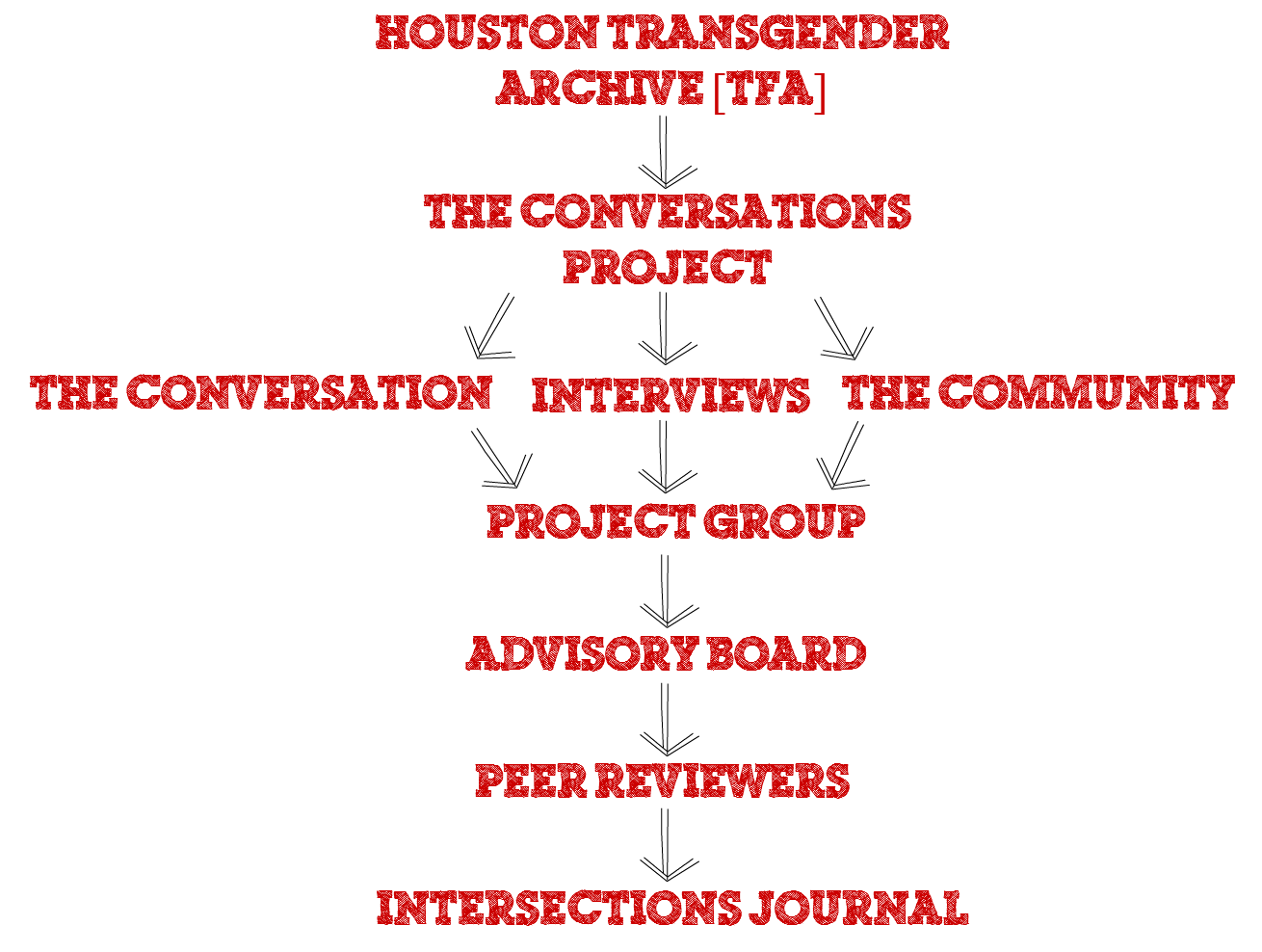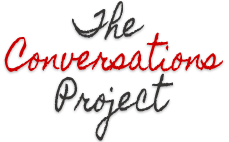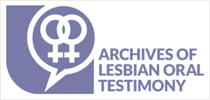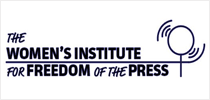![]()
The Conversations Project
Popular media would have you believe that radical feminism itself has a problem with the existence of trans people. The Globe and Mail asserted, “In fact, the most bitter battle in the LGBT movement today is between radical feminists and the transgender movement.” Many other news sources have made similar fact assertions. But, are these fact claims true? Radical feminist John Stoltenberg and trans feminist Cristan Williams work to reveal the reality that exists at the intersection of radical and trans feminism through The Conversations Project.
 Through historical research, interviews, open dialogue, commentary and, academic presentations, we hope to bring attention to a decades-old intersectional trans, intersex, and genderqueer inclusive radical feminist tradition. As a conversation, this project is substantially rooted in the voice of community. The heart of our project is a discussion group comprised of students, professors, community members and numerous trans, intersex, genderqueer, and radical feminist activists, authors and speakers who discuss sex and gender issues through a critical lens. Moreover, group members are encouraged to submit commentary response pieces to Conversation installments, interviews, and group discourse for the Project's journal. Commentary pieces are peer-reviewed and, if approved, are published in the Project's journal: Intersections: a Journal of Trans and Radical Feminism.
Through historical research, interviews, open dialogue, commentary and, academic presentations, we hope to bring attention to a decades-old intersectional trans, intersex, and genderqueer inclusive radical feminist tradition. As a conversation, this project is substantially rooted in the voice of community. The heart of our project is a discussion group comprised of students, professors, community members and numerous trans, intersex, genderqueer, and radical feminist activists, authors and speakers who discuss sex and gender issues through a critical lens. Moreover, group members are encouraged to submit commentary response pieces to Conversation installments, interviews, and group discourse for the Project's journal. Commentary pieces are peer-reviewed and, if approved, are published in the Project's journal: Intersections: a Journal of Trans and Radical Feminism.

In the early 1970s, the pioneering radical feminist opinion leader Andrea Dworkin was talking to one of her friends who was a trans woman. Together, they were having a conversation about the women's liberation movement and her friend said that her experience of this liberation movement was one of exclusion. Years later when Dworkin published her groundbreaking analysis on sexism titled Woman Hating, she included a quote from her trans friend by way of introduction to her book's section on the trans experience:
Dworkin's analysis centers this exclusion as being the "primary emergency" for every trans person, whether they were "white, black, man, woman, rich, or poor". She explicitly rejected absolutist fact assertions that the trans experience was merely the product of faulty socialization and went on to say that the experience trans people face was a product of a faulty society. She went on to suggest the condition of trans people might be better addressed within the context of a society that wasn't defined by a sexed binary.
Unfortunately, the conversation Dworkin began was cut short by sex essentialist activists who worked to exclude trans people from the women's liberation movement. By the mid-1970s, sex essentialist activists sought to exclude trans and intersex people from the dialectic of liberation through structural oppression and outright violence. At the West Coast Lesbian Conference, sex essentialist activists attempted to bash the trans woman who co-organized the event; the radical feminist Robin Tyler protected the trans woman with her own body and was herself bashed by the activists. The Lesbian Tide wrote an open letter to sex essentialist activists affirming their solidarity with their trans Sisters while the militant radical feminist organization Cell 16 ceased operating rather than exclude trans women. After sending a death threat to the women of the Olivia Music Collective, sex essentialist activists showed up to murder the trans woman Sandy Stone but had their guns taken away by security staff Olivia had hired to protect Stone from sex essentialist activist violence. Ginny Berson, co-founder of both The Furies and Olivia Collectives recalled what it was like to deal with the animus of sex essentialist activists directed at trans inclusive women's organizations like hers:
In what became a standing protest of the sex essentialist policies of the Michigan Womyn's Music Festival, Camp Trans was organized as a response to threats of violence against those who were perceived to be trans, even as a 15 year old trans member of the Lesbian Avengers was mobbed by sex essentialists and openly threatened with a knife. Such animus made the types of conversations Dworkin wrote about impossible and as time went on, through the propaganda of sex essentialist activists, even Dworkin came to be viewed by the trans community as being a supporter of the hate they endured.
However, a conversation between Cristan Williams and John Stoltenberg began before either of them knew it. In April 2014 John Stoltenberg published a personal essay about Andrea Dworkin, his life partner for thirty-one years, titled “Andrea Dworkin Was Not Transphobic.” Cristan happened to read it and had a question for John, which she asked him in the comment thread. Unaware of who Cristan was, John replied. Shortly thereafter Cristan contacted John asking if he would be willing to be interviewed in The TransAdvocate, where she is managing editor. One email led to another and before long the two were writing back and forth in what became a wide-ranging, nearly book-length conversation. After several months, they realized what it was all about: “the radical inclusivity of radical feminism,” a conviction that both Cristan and John deeply share. That conversation, which is ongoing, is being published for the first time in installments on this site. As Cristan and John shared aspects of their conversation with others, numerous individuals expressed interest and a small FaceBook discussion group was formed. Within a week, the membership swelled to over 100. Opinion leaders, authors, lecturers, educators and activists alike seemed eager to have their own conversations about a radical feminist tradition that offers a critical framework that challenges pop media narratives about sex and gender while remaining intersectional and inclusive. Thus began The Conversations Project.
 Through historical research, interviews, open dialogue, commentary and, academic presentations, we hope to bring attention to a decades-old intersectional trans, intersex, and genderqueer inclusive radical feminist tradition. As a conversation, this project is substantially rooted in the voice of community. The heart of our project is a discussion group comprised of students, professors, community members and numerous trans, intersex, genderqueer, and radical feminist activists, authors and speakers who discuss sex and gender issues through a critical lens. Moreover, group members are encouraged to submit commentary response pieces to Conversation installments, interviews, and group discourse for the Project's journal. Commentary pieces are peer-reviewed and, if approved, are published in the Project's journal: Intersections: a Journal of Trans and Radical Feminism.
Through historical research, interviews, open dialogue, commentary and, academic presentations, we hope to bring attention to a decades-old intersectional trans, intersex, and genderqueer inclusive radical feminist tradition. As a conversation, this project is substantially rooted in the voice of community. The heart of our project is a discussion group comprised of students, professors, community members and numerous trans, intersex, genderqueer, and radical feminist activists, authors and speakers who discuss sex and gender issues through a critical lens. Moreover, group members are encouraged to submit commentary response pieces to Conversation installments, interviews, and group discourse for the Project's journal. Commentary pieces are peer-reviewed and, if approved, are published in the Project's journal: Intersections: a Journal of Trans and Radical Feminism.
How the Conversation Began
In the early 1970s, the pioneering radical feminist opinion leader Andrea Dworkin was talking to one of her friends who was a trans woman. Together, they were having a conversation about the women's liberation movement and her friend said that her experience of this liberation movement was one of exclusion. Years later when Dworkin published her groundbreaking analysis on sexism titled Woman Hating, she included a quote from her trans friend by way of introduction to her book's section on the trans experience:
How can I really care if we win "the Revolution"? Either way, any way, there will be no place for me.
Dworkin's analysis centers this exclusion as being the "primary emergency" for every trans person, whether they were "white, black, man, woman, rich, or poor". She explicitly rejected absolutist fact assertions that the trans experience was merely the product of faulty socialization and went on to say that the experience trans people face was a product of a faulty society. She went on to suggest the condition of trans people might be better addressed within the context of a society that wasn't defined by a sexed binary.
Unfortunately, the conversation Dworkin began was cut short by sex essentialist activists who worked to exclude trans people from the women's liberation movement. By the mid-1970s, sex essentialist activists sought to exclude trans and intersex people from the dialectic of liberation through structural oppression and outright violence. At the West Coast Lesbian Conference, sex essentialist activists attempted to bash the trans woman who co-organized the event; the radical feminist Robin Tyler protected the trans woman with her own body and was herself bashed by the activists. The Lesbian Tide wrote an open letter to sex essentialist activists affirming their solidarity with their trans Sisters while the militant radical feminist organization Cell 16 ceased operating rather than exclude trans women. After sending a death threat to the women of the Olivia Music Collective, sex essentialist activists showed up to murder the trans woman Sandy Stone but had their guns taken away by security staff Olivia had hired to protect Stone from sex essentialist activist violence. Ginny Berson, co-founder of both The Furies and Olivia Collectives recalled what it was like to deal with the animus of sex essentialist activists directed at trans inclusive women's organizations like hers:
It was horrible. It was ugly and destructive and mean-spirited and just stupid. How much easier it is to attack people close to you than to focus on the patriarchy! It was painful. It felt like everything we had done was invisible and irrelevant to those people.1
In what became a standing protest of the sex essentialist policies of the Michigan Womyn's Music Festival, Camp Trans was organized as a response to threats of violence against those who were perceived to be trans, even as a 15 year old trans member of the Lesbian Avengers was mobbed by sex essentialists and openly threatened with a knife. Such animus made the types of conversations Dworkin wrote about impossible and as time went on, through the propaganda of sex essentialist activists, even Dworkin came to be viewed by the trans community as being a supporter of the hate they endured.
However, a conversation between Cristan Williams and John Stoltenberg began before either of them knew it. In April 2014 John Stoltenberg published a personal essay about Andrea Dworkin, his life partner for thirty-one years, titled “Andrea Dworkin Was Not Transphobic.” Cristan happened to read it and had a question for John, which she asked him in the comment thread. Unaware of who Cristan was, John replied. Shortly thereafter Cristan contacted John asking if he would be willing to be interviewed in The TransAdvocate, where she is managing editor. One email led to another and before long the two were writing back and forth in what became a wide-ranging, nearly book-length conversation. After several months, they realized what it was all about: “the radical inclusivity of radical feminism,” a conviction that both Cristan and John deeply share. That conversation, which is ongoing, is being published for the first time in installments on this site. As Cristan and John shared aspects of their conversation with others, numerous individuals expressed interest and a small FaceBook discussion group was formed. Within a week, the membership swelled to over 100. Opinion leaders, authors, lecturers, educators and activists alike seemed eager to have their own conversations about a radical feminist tradition that offers a critical framework that challenges pop media narratives about sex and gender while remaining intersectional and inclusive. Thus began The Conversations Project.
![]()
Project Structure
The Conversations Project is a program of the Houston Transgender Archive (TFA), a 501(c)3 nonprofit. The Project, through the generous support of our partnerships and community members, seeks to inspire informed critical discourse rooted in an intersectional trans and radical feminist perspective.


![]()















